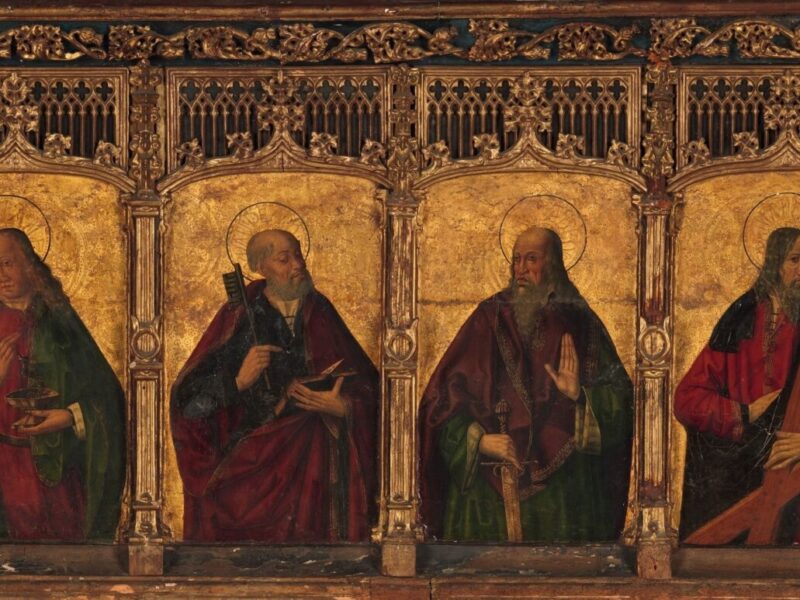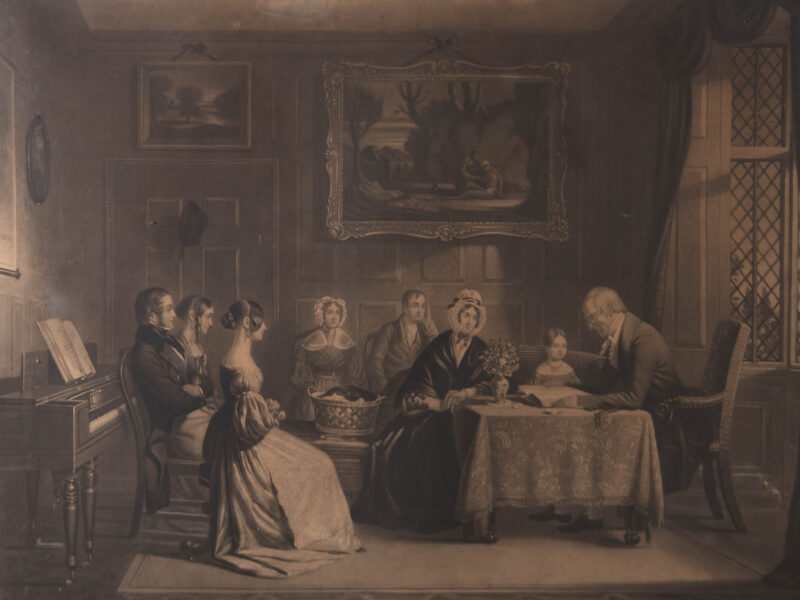Four hundred sixty-nine years ago, Bishops Hugh Latimer and Nicholas Ridley were bound to a wooden pyre. Their bodies were restrained and immovable. The pyre was lit and the men burned up and burned away into martyrdom and into history with Bishop Latimer immortally encouraging his companion, “Be of good cheer, Master Ridley, and play the man, for we shall this day light such a candle in England as I trust by God’s grace shall never be put out.”
Latimer would die quickly, but Master Ridley indeed played the man and would suffer in his burning, crying out, “Lord, have mercy” and “I cannot burn.” Meanwhile, from his prison cell, former Archbishop Thomas Cranmer watched the martyrs and the same death he would suffer five months later in March 1556.
Outside Anglicanism, and even within Anglicanism, these men are forgotten. However, the efforts of these men, especially that of Archbishop Cranmer, gifted the English-speaking peoples the blessings of worshipping in our common tongue and reading the Holy Scriptures in our native language. Baptists who use our marriage vows and burial rites, Roman Catholics worshipping in the vernacular, and even Eastern Orthodox in former British colonies all profit from the commitment of these reformers who provided common prayer into the common language. Ironically, perhaps more non-Anglicans use portions of the Book of Common Prayer and the Authorized (King James) Version of the Scripture than Anglicans do in North America. These trailblazers are men to whom we owe our inheritance and who literally blazed from this life into the Kingdom. Yet, contemporary Anglicans have often forgotten their heritage and instead of burning out brightly in this life, we allow this evil age to snuff out the faith of our fathers.
Modern Protestantism is utterly foreign to the theology of the reformers – not only that of the British Isles but also that of Lutheran Germany and the Continental Reformed. Magisterial Protestants, especially Lutherans and Anglicans, disavow the word “Protestant” because the Radical Reformation has multiplied and to a certain extent won in North America. However, their vapid (and non-existent) theology and secular worship found in most anabaptist North American churches should not be found in the churches of the English Reformation. Alas, but how many North American Anglicans have deserted their inheritance and ape for the uninspired services of nondemonationalism or larping of Roman Catholicism? We have forgotten that our English reformers were Protestant because they are Catholic. They are reformed catholics who gifted us ancient Christianity rooted in the Holy Scriptures. We have a heritage that roots us in Christ Jesus and a faith that beckons us to point this de-sanctified world into an encounter with the sacred God through faith and in His sacraments.
Therefore, let us not boast in our heritage but in our inheritance. The time is not to back down nor away from the Gospel of Jesus Christ, but to boldly proclaim what the Holy Scriptures clearly reveal – God created us in His image and saves us despite marring ourselves in sin. God becomes an image-bearer to cleanse His image-bearers and to more than restore us – He empowers us to reflect the image of the New Adam – Jesus Christ. He comes to us as the Good Shepherd and leads us through the valley of the shadow of death by His own Son’s blood. Our Good Shepherd fills us with His body and His blood by faith and empowers us weak and weary sinners by His own Holy Spirit.
The candle lit in England by Latimer and Ridley has been carried across the globe by English speakers from North America to Australia and all points between. As Cranmer eloquently wrote in the prayer book, may we “not be ashamed to confess the faith of Christ crucified, and manfully to fight under his banner against sin, the world, and the devil, and to continue Christ’s faithful soldier and servant unto his life’s end. Amen.”
Cranmer’s words bring to mind the words of another English bishop who lived three hundred years after his martyrdom but predates us by over a hundred: Bishop J.C. Ryle. Hear what Ryle beckons us to do from his commentary on Matthew 16:
“We must not conceal from ourselves that true Christianity brings with it a daily cross in this life, while it offers us a crown of glory in the life to come. The flesh must be daily crucified. The devil must be daily resisted. The world must be daily overcome. There is a warfare to be waged, and a battle to be fought. All this is the inseparable accompaniment of true religion. Heaven is not to be won without it. Never was there a truer word than the old saying, ‘No cross, no crown!’ If we never found this out by experience, our souls are in a poor condition.”
Our duty and our call are not to live in the past but to press against the powers, authorities, “against the cosmic powers over this present darkness” in the world that delights in Christians looking backward while the gates of hell go unstormed. The Enemy is alive and well, therefore let us take the fight to him. Let us die, but let us die like men and not as armchair theologians weighed down by the fatness of our unlived theology. The prayer book Cranmer gifted us calls us to die to ourselves in prayer, Gospel-proclamation, and Gospel living – let us get to it! The baptismal rites are not to sit about and gather dust – let us go and make disciples. The marriage rite is not there to be broken – let us build godly marriages. The ordinal is not given for us to make ministers but to send out the called to minister to the called – let us plant missions that reflect the English-speaking Christianity we were gifted.
Yes, the Enemy comes for us. Have we forgotten, “Lord, even the demons are subject to us in your Name.” Indeed, the battle is not nigh but is already here. Fear not, for Jesus tells us “I saw Satan fall like lightning from heaven.” Therefore, let us take up God’s armor and speak the truth in love. Our Lord God lives! And our Lord God equips us, saying “Behold I have given you authority to tread on serpents and scorpions and over all the power of the enemy, and nothing shall hurt you.” Yet how often do we reserve the Gospel to ourselves and fear hurting feelings over sharing God’s gracious love and salvation for sinners? No longer do we have the barrier of translating the Gospel from Latin to English, but are we inheritors of the English Reformation too weak to overcome the self-imposed barrier of speaking the Gospel to our neighbor?
We are called to resist the darkness of this age with the light of the Gospel. Yet too many of us Anglicans worry too much about how we are seen by our unbelieving neighbor than how Almighty God sees our inaction. Give glory to God and witness to your neighbor how you are redeemed. Our test and trial are nothing compared to those of the martyrs of old. The Oxford Martyrs were willing and able to suffer for their faith – are we not willing to suffer mere inconvenience to share their faith and our faith in our own tongue with those souls nearest to us?
Be of good cheer dear Christian, and play the man. The candle lit in England four centuries ago burns bright and shall burn brighter still in North America and beyond by God’s grace.





'The Oxford Martyrs: A Call to Faithfulness' have 2 comments
October 16, 2024 @ 11:47 am Cpg Cottam
In1568 Cranmer lead a deputation to Parliament to specify the role of bishops in the newly reformed church . They were to have two functions:
1. To protect sound doctrine &
2. To bring many to Christ.
As modern bishops do neither two questions arise:
1. Can Anglicanism thrive without bishops? &
2. If you get rid of them what replaces them?
October 18, 2024 @ 1:00 pm Jesse Barkalow
Thank you, Archdeacon Andrew, for writing with both knowledge and zeal. That is exactly what the church needs and why The North American Anglican is valuable. May all those who refuse to serve the Church keep silent on things which they cannot understand because they will not first obey.